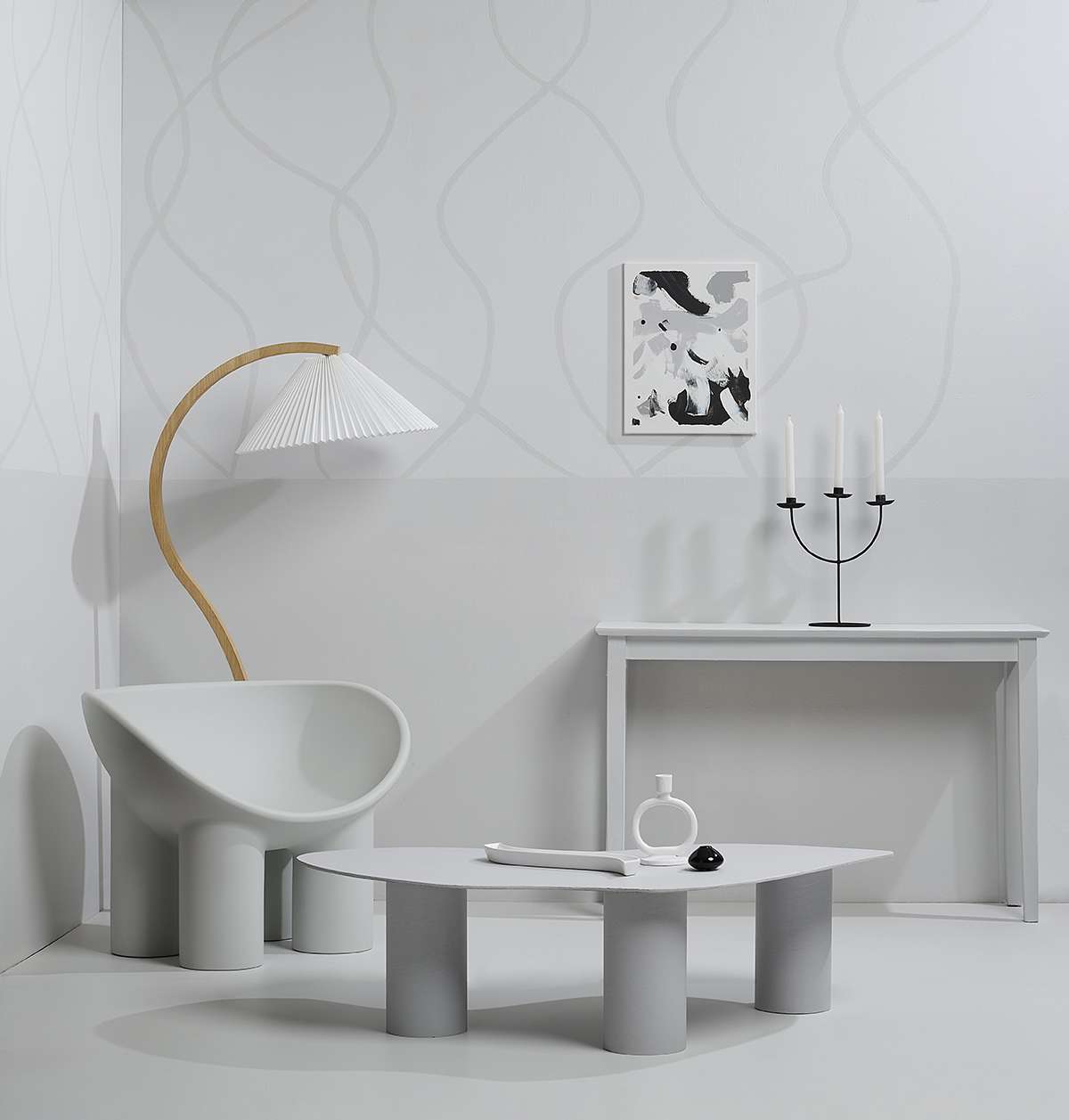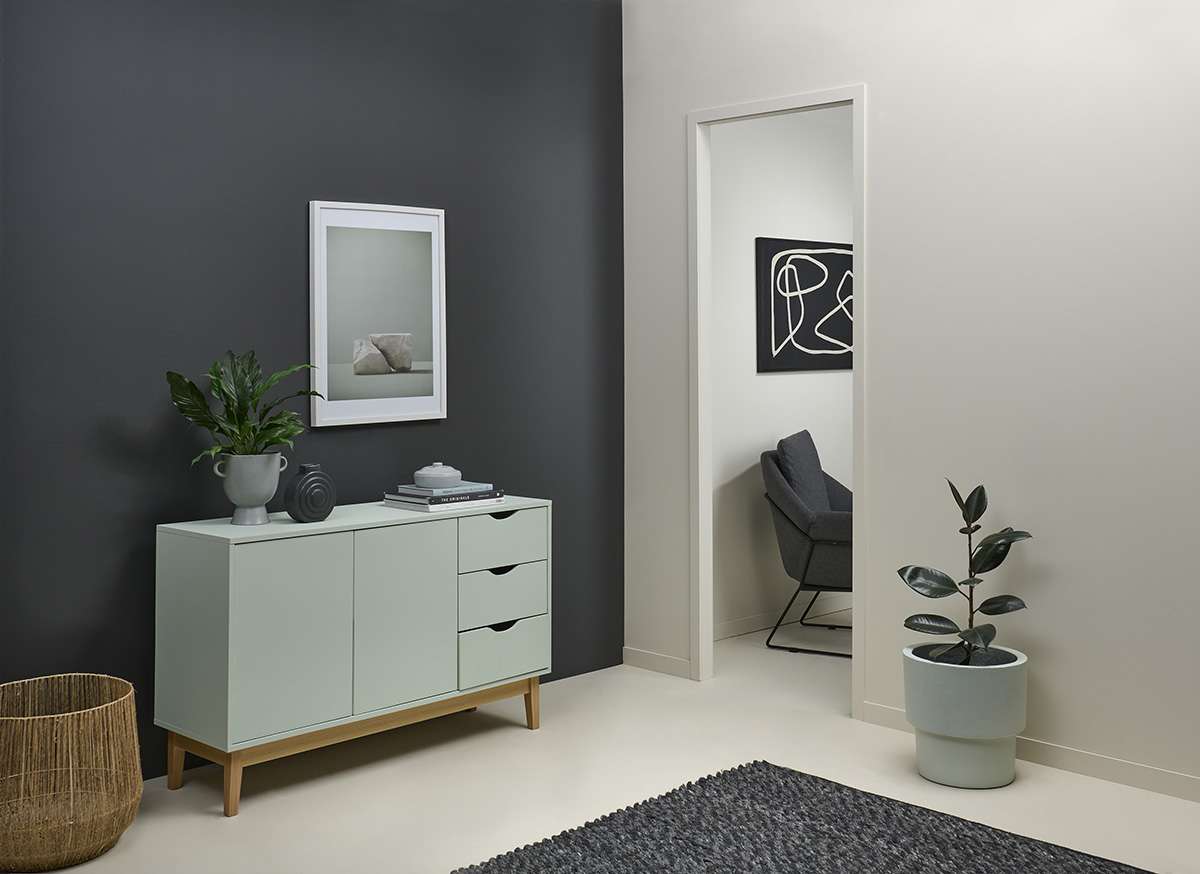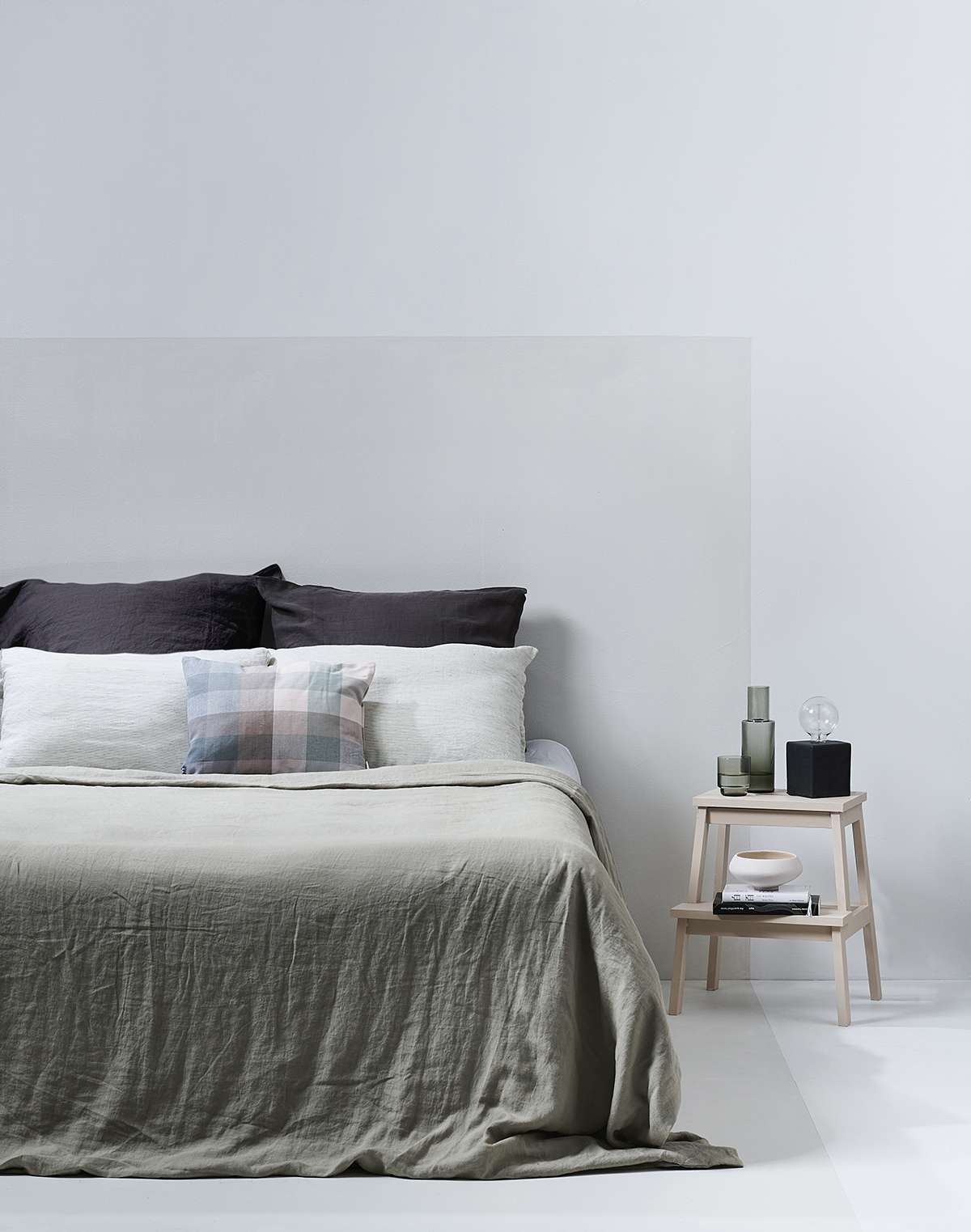Minimalism used to have quite austere associations; crisp and cool white-on-white interiors with zero clutter, strict organisation and little room for personalisation and flair.
Today’s minimalism, borne out of several years of social upheaval, is a little warmer and a little more relaxed. It still frees us from the stress of clutter with an emphasis on finding freedom in order, but comes more from the perspective that your time is better spent on connecting with people and enjoying life, than constant tidying or adhering to self-imposed rules of organisation.
The same post-pandemic influences of getting back to nature and simplifying life that are driving other interior trends like cottagecore and biophilic design are also influencing our new approach to minimalism.
Where to start
Start your property search

The subtle design painted on the walls of this sitting area adds visual interest to the minimalist tonal layers of the colour palette. The upper wall is painted in Resene Half Concrete with the lower wall and abstract lines in Resene Concrete. Floor painted in Resene Quarter Concrete, console table in Resene Concrete, coffee table in Resene Triple Concrete, circle candleholder in Resene Half Sauvignon and artwork in Resene Concrete, Resene Triple Concrete and Resene Element. Wood lamp and ball cushion from Bohzali, gass and metal bubble lamp from Citta, chair from David Shore, bubble vases and circle candleholder from H&M Home. Project by Melle Van Sambeek, image by Bryce Carleton.
Resene colour consultant Jill Marsh says modern minimalism is about sustainability and having a lighter footprint.
She recommends keeping to plain and simple natural textured materials like cotton and linens for furnishings, curtains and blinds and keeping surfaces as clutter-free as possible.
Keep the look feeling clean with a minimal amount of furniture, Jill says, adding that finding multi-functional pieces, such as a coffee table with a good amount of out-of-sight storage, is a good way to get the most out of the pieces you curate for your rooms.
Top tip: If you add extra storage it can be tempting to hang on to things you “might need in the future”. As a general rule when decluttering, if you haven’t used something in five years you’re probably not going to use it in the next five.
When it comes to decorating with your personal effects, keep your selection to one or two statement or ‘hero’ pieces that pull the room together, but most importantly, that you love to look at, is relevant and important to your family, and that won’t date
If you choose this piece for your room first, it can help you make decisions about the rest of your colour scheme or decor. Keep everything focused on showcasing that piece and your choices will become more minimalist as others pieces fall away.
Jill adds that using recycled and repurposed furniture and decor is a great way to keep to the sustainability, low-footprint ideas of modern minimalism. Just repaint or stain to keep to your pared-back colour palette.
Choosing your colours

Simple tonal accessories bring warmth without clutter to this modern minimalist space. The walls and floor are painted in Resene Rice Cake. The table is Resene Eagle, the book is Resene Avocado and the large planter is Resene Aspiring. Sofa from Nood, plant from Adairs, fringed cushion from Bed Bath and Beyond, linen cushion from The Warehouse, textured and striped cushions, mug and flower arrangement from Freedom, throw blanket from H&H Home. Project by Vanessa Nouwens, image by Bryce Carleton.
Minimalism does naturally lend itself to a neutral and pared-back colour palette in whites, greys and taupe accented with wood colours and textures. Jill suggests playing with modern neutrals like the classically popular white Resene Double Alabaster, delicate pink-toned beige Resene Despacito, subtle green Resene Secrets or pale blue Resene Slipstream. Cushions, throws and linens with hues like blush pink, greens and blue can serve as muted accent colours to complement the neutral scheme, Jill says.
You can still experiment with colour in a modern minimalist look, you might just want to keep it to one bold accent shade that will really pop against a more neutral backdrop.
Some combinations to try are a softer monochrome look with smoky dark brown Resene Kia Kaha rather than classic black. Pair it with a snowy white like Resene Aoraki for fresh, crispness and a natural timber finish in Resene Colorwood Natural wood stain.
Opting for muted, earthy tones is another way to bring your minimalism up-to-date while adding touches of warm colour. Try the soft terracotta of Resene Dawn Glow, with yellowed-white Resene Rice Cake as your neutral, and even a note of pastel green Resene Transcend.
While minimalism is traditionally often associated with a neutral or pale colour palette, trying one darker colour can actually be an effective way to let your minimalist aesthetic shine through. The colour can be impactful enough that you don’t need a lot of other decor in the space. Opting for the colours of nature is a good way to keep the finished look from becoming too ‘loud’ or overpowering. Try a soothing dark green like Resene Deep Teal or a relaxing midnight blue like Resene Welcome.
Go beyond one room

Modern minimalism doesn’t need to be white-on-white. This bold feature wall painted in Resene Nocturnal gives this room a clean yet dramatic backdrop and links it to the connecting space. The flooring is painted in Resene Akaroa, with the side wall and connecting room wall in Resene Quarter Akaroa. The sideboard and floor planter are Resene Rainee, the handled planter is Resene Pumice, the textured vase is Resene Nocturnal and the lidded bowl is Resene Silver Chalice. Sofa from Contempa, basket and cushions from Freedom. Project by Vanessa Nouwens, image by Bryce Carleton.
For a minimalist approach, it’s a good idea to start small with one room, especially if decluttering is new to you. Gradually, however, you might want to adopt the approach throughout your whole home. Minimalism does tend to work best when you have one, similar look in most rooms, with just a few personalised colour choices for interest.
Jill says using the same colour scheme throughout your home will help connect all the spaces together and allow for a seamless flow, which, as well as emphasising your clean, minimalist approach, can make your home feel larger and airier.
Another way to add interest to a pared-back palette is to use varying shades of one colour and vary the levels of sheen on different surfaces to bounce light, or draw attention to different areas. Jill suggests a flat finish, such as Resene SpaceCote Flat, on the ceiling, with a low sheen, such as Resene SpaceCote Low Sheen, on the walls, and then a semi-gloss finish like Resene Lustacryl on trim areas like skirting boards, window frames, doors and frames.
For a contemporary take on classic neutral minimalism try Resene Half Tea as your main shade and pair it with different strengths of the same colour from Resene Quarter Tea through to Resene Triple Tea. The result will be a cohesive colour scheme that still offers plenty of visual interest and different looks between spaces. If you want one pop of a non-neutral accent, try on-trend burnt orange Resene Moroccan Spice or dusky grey-blue Resene Watermark.
Texture and textiles

Softer textures soften this white-on-white backdrop where a Resene Double Black White painted rectangle frames the bed against a Resene Quarter Black White wall and floor. The step stool is painted in Resene Alpaca, the outside of the bowl is Resene Pearl Bush with Resene Alpaca inside and the lamp base is Resene Armadillo. Duvet, pillowcases, sheets, cushions, throws and basket from Citta, carafe and glass from Freedom, candleholders from H&M Home. Project by Laura Lynn Johnston, image by Bryce Carleton.
If you’re keeping to a very neutral or simple minimalist colour range, there are ways to add visual interest without adding clutter.
Subtle use of texture, whether it’s in your window dressings, a cushion or a lampshade, a subtly textured wallpaper or wooden battens on the walls, will help your eye see the boundaries and dimensions in the room. If you’re opting for a classic white-on-white style minimalist look, a room can start to feel a bit harsh or one-dimensional if there is no texture to add shadowing and interest.
Adding a leafy green plant or something in an organic, or soft curved shape is another way to add a more relaxed, welcoming finish to your space. It’s another way to connect your interior with the natural world which is a key part of today’s minimalist looks.
Remember, modern minimalism isn’t about strict rules or overly restricting yourself, it’s simply about being considered in the colours you choose, and the items you want to have in each space. It gives you the freedom to create spaces that you love and find inspiring, rather than simply going with the flow and without a plan.
For help choosing colours to suit your projects, visit your local Resene ColorShop, ask a Resene Colour Expert online, www.resene.co.nz/colourexpert or book a Resene Colour Consultation, www.resene.co.nz/colourconsult.











